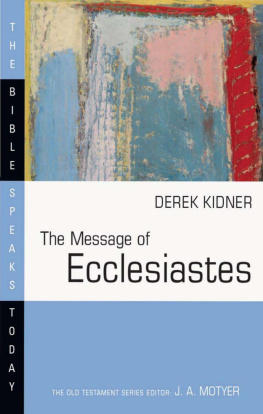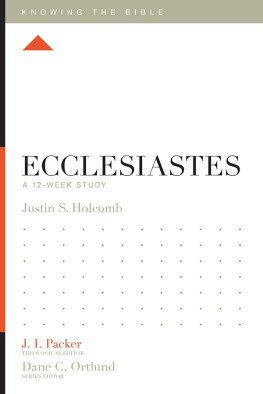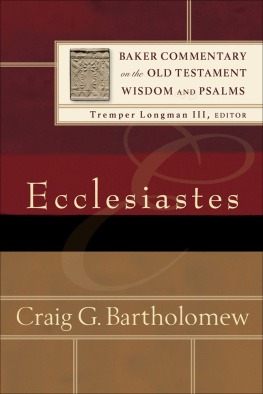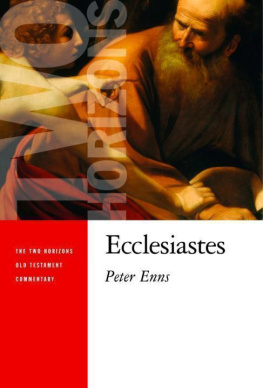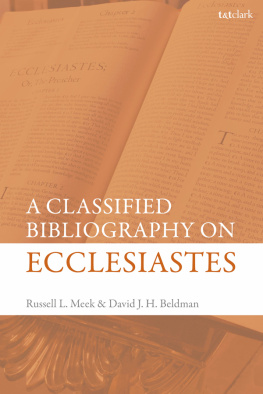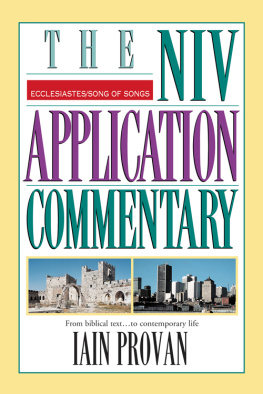The Message of Ecclesiastes
A Time to Mourn, and a Time to Dance
DEREK KIDNER
Contents
General preface
The Bible Speaks Today describes a series of both Old Testament and New Testament expositions, which are characterized by a threefold ideal: to expound the biblical text with accuracy, to relate it to contemporary life, and to be readable. These books are, therefore, not commentaries, for the commentary seeks rather to elucidate the text than to apply it, and tends to be a work rather of reference than of literature. Nor, on the other hand, do they contain the kind of sermons which attempt to be contemporary and readable, without taking Scripture seriously enough. The contributors to this series are all united in their convictions that God still speaks through what he has spoken, and that nothing is more necessary for the life, health and growth of Christians than that they should hear what the Spirit is saying to them through his ancientyet ever modernWord.
J. A. MOTYER
J. R. W. STOTT
Series Editors
Authors Preface
ANYONE who spends time with Ecclesiastes (that least ecclesiastical of men) finds himself in the company of a highly independent and fascinating mind. This leads me to say two things. First, to express thanks to the editor of this series for giving me the excuse to study the book more closely than before. Secondly, to suggest that some readers may do well to go straight to Part Two, the running commentary, where they can hear the Preacher himselfadmittedly with interruptions from mewithout waiting for the survey which is attempted in Part One. It depends on whether one prefers to have things mapped out in advance, or to plunge in and feel ones way along. Either way, may it be a journey home.
DEREK KIDNER
Tyndale House, Cambridge
Chief Abbreviations
ANET | Ancient Near Eastern Texts by J. B. Pritchard (2nd ed., OUP, 1955). |
AV | English Authorized Version (King James), 1611. |
Barton | Ecclesiastes by G. A. Barton ( International Critical Commentary , T. & T. Clark, 1908). |
Delitzsch | The Song of Songs and Ecclesiastes by F. Delitzsch (T. & T. Clark, 1891). |
Gk. | Greek. |
Heb. | Hebrew. |
JB | The Jerusalem Bible, 1966. |
Jones | Proverbs, Ecclesiastes by E. Jones ( Torch Bible Commentaries , SCM Press, 1961). |
LXX | The Septuagint (pre-Christian Greek version of the Old Testament). |
McNeile | An Introduction to Ecclesiastes by A. H. McNeile (CUP, 1904). |
mg. | margin. |
MS (s) | manuscript(s). |
MT | Massoretic Text. |
NEB | The New English Bible, Old Testament, 1970. |
RSV | American Revised Standard Version, 194652. |
RV | English Revised Version, 188184. |
Scott | Proverbs, Ecclesiastes by R. B. Y. Scott ( Anchor Bible , Doubleday, 1965). |
TEV | Todays English Version, Proverbs and Ecclesiastes: Wisdom for Modern Max (American Bible Society, 1972). |
Part One: What is this book doing in the Bible?
THE voice of the Old Testament has many accents. There is almost everything there, from the impassioned preaching of the prophets to the cool, reflective comments of the wiseand a whole world of poetry, law, story-telling, psalmody and vision in between. But there is no-one quite like Qoheleth (to give him his untranslatable title); no book in this whole great volume which speaks in quite his tone of voice. His natural habitat, so to speak, is among the wise men who teach us to use our eyes as well as our ears to learn the ways of God and man. Some of his sayings could have come straight out of Proverbs, and he has a way of pausing to steady us and give us our bearings by this homely wisdom, at intervals between our more unsettling excursions with him. Wisdomquite practical and orthodoxis his base-camp; but he is an explorer. His concern is with the boundaries of life, and especially with the questions that most of us would hesitate to push too far. His probing is so relentless that he can easily be taken for a sceptic or a pessimist. His opening cry, Vanity of vanities!, or Utter futility!, almost asks for it; but there is more to him than can be captured in a phrase, even a motto-phrase. So much more, in fact, that at one time there were scholars ready to suggest that two, or three, or even as many as nine different minds had been at work on the book. Such are its cross-currents and swift changes; but they can all be seen as the insights of a single mind, approaching the facts of life and death from a variety of angles. At bottom we can find the axiom of all the wise men of the Bible, that the fear of the Lord is the beginning of wisdom. But Qoheleth plans to bring us to that point last of all, when we are desperate for an answer. There are hints of it in passing, but his main approach is from the other end: the resolve to see how far a man will get with no such basis. He puts himselfand usin the shoes of the humanist or secularist. Not the atheist, for atheism was hardly a going concern in his day, but the person who starts his thinking from man and the observable world, and knows God only from a distance. This of course is asking for complications. There will be tension between the writers deepest self, as a man of conviction with a faith to share, and his provisional self as a man groping his way by the light of nature. And this second self has its own conflicts, familiar to us all, between the voices of conscience, self-interest and experience, and between God as we acknowledge Him and God as we treat Him. Once we see what is broadly happening in the book, it is not too difficult to find our way about it; and the running commentary may provide some further help. Meanwhile it may be useful to bring together some of the teachings that are scattered through its pages, and look for the general thrust of the argument.
Facts to face about God
If one believes in God at all, the implications deserve to be followed right through. Qoheleth expects us to do this, and not to imagine that we can take liberties with our Maker or manipulate Him in our interests. We are confronted with God at His most formidable: as one who is not impressed by our chatter or by our ritual gifts and airy promises. The opening paragraphs of chapter 5 drive home these points with vigour. God is in heaven, and you upon earth; therefore let your words be few... He has no pleasure in fools. God meets us in this book in three main aspects: as Creator, as Sovereign, and as Unsearchable Wisdom. Not that any of these actual terms are used of Him, except the first; but they may serve as a convenient focus.
As Creator , He sets the whole scene. We are reminded that His world has its own obstinate shape which we cannot iron out to our liking (which therefore, incidentally, has a certain built-in resistance, mercifully enough, to us as planners and standardizers ); for who can make straight what he has made crooked? (7:13). It also has its own inexorable rhythm in which we find ourselves caught up: a time for this and a time for that, with very little choice for us in the matter, as chapter 3 points out. Even as procreators we do no more than activate the mysterious process in which God brings into being a new life. As you do not know how the spirit comes to the bones in the womb of a woman with child, so you do not know the work of God who makes everything (11:5). But we are not allowed the luxury of blaming the Creator for our tangles and misdeeds, as the Babylonian Theodicy blames the gods, for God made man straightforward. The responsibility is put where it belongs, in the sequel to that remark: but man invents endless subtleties (7:29, NEB ).

